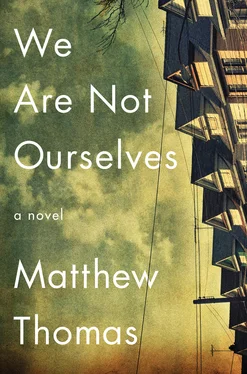Something in his mother’s message compelled him to return her call right away and not merely resolve to do so before the weekend was over. She would never have delivered bad news on an answering machine, but there must have been a hint, a subtle quaver, and a hint was all he needed. For years, he had been tuned to the peculiar frequency of disaster. It was irrational, he knew; his father’s disease augured no sudden change in fortune, only a long decline; nevertheless, whenever the phone rang in his sleep, he awoke with a start and sprang to his feet.
“Your father is sick,” she said when he reached her.
He looked around at his apartment. Papers were strewn everywhere; a thick layer of dust had settled on every surface. Neither he nor his roommate had done any cleaning in weeks. It was their last stretch in college, and each of them was responsible for wringing as much as he could out of the dwindling days. He considered the smells: the faint ammonia reek of dirty clothes, the mildew musk that drifted out from dishes in the murky sink, which only got washed when his roommate’s girlfriend complained.
“He’s not going to make it through the night,” his mother said, with none of the bluster that entered her voice when she knew she was right. She sounded vulnerable. It might have been the first time he’d ever heard her sound that way.
“Are you sure?” he asked, but it was an idle question; she’d watched hundreds of people die.
“He has pneumonia,” she said calmly. “That’s bad for someone in his situation.”
“Why didn’t you call sooner?”
“I was waiting to see if he’d make it through. I didn’t want to pull you away unnecessarily. Anyway, I’m calling now.”
“How is he?” It was a dumb question, but he hoped, even half expected, that his mother’s answer would be different this time — modulated, hedging.
“Everything’s quiet,” she said. “I’m by the bed. I’m trying to make him comfortable.”
He could see the nursing home shrouded in darkness, the hallway dark but for the sliver of light shining out under his father’s door. He could see his mother’s hand on his father’s chest, the labored breathing, the terror in his father’s eyes.
“We’ll have to hope he lasts until you get here,” she said. “Call JetBlue. Put it on the American Express.”
He didn’t have a credit card of his own. His mother had given him the Amex the day he left for college. It listed his name in full caps, CONNELL J. LEARY, and above it, Member Since 67. “In case of emergencies,” she’d said as she handed it over before she headed to work that morning. The very last thing she’d said, as always, was “Be careful.”
• • •
It was with a sense of ceremony that he packed for his trip. The nervous excitement that attended any travel filled his chest, but he was preparing for a greater journey. They said that a father’s death was a defining moment in a man’s life, perhaps the defining one. He was about to be ushered into an immense and silent club of men who shared the knowledge of one of life’s singular passages. He was humbled by the possibility of waking up a different person, one with the stamp of legitimacy on him. Every shirt he folded into the bag, every pair of socks he picked out from the rest, he envisioned outfitting the better self that was, perhaps, being born into the world. A solemn suit, sensible slacks, his best shoes: the destiny for which he had been preparing was coming into focus. There were matters to attend to: taking out the trash, washing the dishes in the sink. He dispatched them with an intensity he had never been able to summon before. They were the precursor to the larger duties he was about to perform, as son to his mother and ambassador for his family — in short, as the man of the house. Every move he made had the imprimatur of purposefulness. There was no time for sentiment, only for the handling of tasks that a man ought to do well and uncomplainingly.
He stood in the doorway for a moment, looking out, for perhaps the last time with eyes of an adolescent, at the view of the street from his place. He breathed deeply the evening air, the smell of trees and car exhaust. His apartment seemed suddenly quaint; he felt a tremendous affection for the life he had been leading. He would leave it all behind. He would begin anew. Nothing could stop him; nothing could hurt him; he could walk on coals and get to the cool other side.
Before he left, he called again. “How is he?” he asked, because he couldn’t ask the obvious: Is he alive?
“He’s in pain,” she said, “but he’s still here.” Her voice broke. “I told him you were coming. He squeezed my finger.”
At Midway, he checked in, passed through the detectors, and took a seat at the gate. There wouldn’t be much of a wait; he had arrived shortly before departure. He settled in and tried to read a book, but he was seized by panic at the thought of his father dying. He had been living without his father for some time already, but he still made pilgrimages to him, for the advice he listened for in his father’s heartbeats, ear pressed to his chest; for the reassurance in his constancy; for the comfort he felt when he nuzzled him close and registered the soft, unconscious rhythm of his breath on his neck. He was still the standard-bearer; he was still his father.
They started boarding the plane. The back rows, his group, boarded first. He felt like a horse stomping at the gate, ready to dash off the plane when it landed. He hadn’t checked any bags; his uncle Pat would be waiting for him at the airport.
He was the first to his row. He put his book into the seat pocket, lowered the tray table, and drummed his fingers. Stragglers filed in slowly. Soon he would have to get up for the person in the window seat, or watch the one in the aisle stuff his things into the overhead bin. He wished he hadn’t rushed aboard. He didn’t need to use the bathroom, but he replaced the table and rose anyway.
He pressed close to the mirror, leaned his forehead against it. His breath collected on it. He would stay there as long as he needed to. He was looking for something, some confirmation, though of what he wasn’t sure.
Then he saw it. It was all there: his father’s aspect of perpetual surprise; his father’s widow’s peak, which seemed to climb his scalp in flight; his father’s nose, which flared out slightly at the nostrils; his father’s jaw, which gave ballast to the rest; the cavity in his father’s chin; the black hair; the slightly overlarge ears.
He bared his teeth. They were, against all odds, perfectly straight. As a kid he had avoided the nighttime headgear designed to supplement the corrective pull of his braces. He had faked the log that documented his wear time. At the panic-stricken last minute before heading to the orthodontist, overwhelmed by the enormity of so much squandered time, he had switched pens and varied the numbers, composing fictions that attested to his discipline and endurance. His father drove him to the orthodontist once a month for two full years; every time, Connell waited to hear the guilty verdict; every time, he was spared. His father never called him on it either; he was happy enough to take him for a ride, happy enough to shell out bucks he didn’t have for the sake of his son’s smile. The world of adults seemed to budget for the carelessness of children.
His teeth were not his father’s. His father had a bridge that he washed under the faucet and click-clacked for Connell when he asked him to. He had a cracked front tooth that he lost half of when he fell to the brick floor in the kitchen while Connell brooded in his room.
“You are flying home,” he said to the mirror, hoping to ground himself in the reality of what was happening. “Your father is dying. He is your best friend. You will never be the same again.”
Читать дальше
Конец ознакомительного отрывка
Купить книгу












